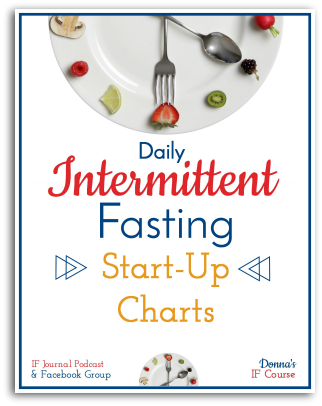
In this Broadcast, Donna Reish, blogger, author of 100 curriculum books for preschool through twelfth graders, seeker of health and fitness, and Intermittent Fasting teacher, talks about the benefits of adequate sleep and the downside of too little sleep. She begins the broadcast with her and her husband’s fasting update and what she has been learning from Dr. Stephan Guyenet’s book, The Hungry Brain. Specifically, Donna points out how important it is to control our food environment if we want to reduce our processed food intake and eat more real foods/less calorie dense foods on a regular basis—and how to make treats into the “special occasions” that they should be. Then she digs into statistics on sleep in general—how much we sleep today vs thirty years ago; circadian rhythms, and more. Next, Donna gives the many benefits of sleeping 7 to 9 hours each night (including its effect on weight management efforts). Then she goes into detail about the detriments of too little sleep, which include lowering of Human Growth Hormone, raising of cortisol (stress hormone), lessening of our response to leptin (satiety hormone), and much more. This week’s broadcast is sponsored by Plexus supplements. Specifically, Donna taught about Plexus’ magnesium supplement, BioCleanse, today! Donna is offering a FREE private FB group centered around weight management coaching and teaching for all of her wholesalers and customers in the coming year!
Get More Info!
(1) Free “Calories In/Calories Out” Game Video Series
(3) FREE One-Hour IF Webinar (last week of each month)
(4) Month-Long IF Course (daily video teaching, outlines, graphics, and more!)
(5) Private FREE FB Group where I teach each week
(6) FREE YouTube Videos–Weekly Broadcasts AND Fast Shot Teachings
(7) Weight Management Coaching and Teaching for Plexus Supplement Users
A. Our Story
1. Stalled!
a. Stalled from November vacay/wedding/beginning of holidays to January
b. Kept losing inches and fitting into small clothes
c. No significant pounds lost or gained (net)
2. No reason to go off and on!
a. Lifestyle
b. Appetite Correction makes it easy to get back to healthier choices after holidays and festivities
c. Smaller eating window yields less mindless eating and extra calories
3. Changing our eating environment
a. Stephan Guyenet’s Hungry Brain
b. Turns out the old fashioned advice to not have the unneeded/unwanted/highly processed food around was correct!!!
c. Create barriers to the foods that are not as healthy or that you want to avoid
d. We eat real foods/healthy foods at home on a daily basis—so avoiding too much food outside of those helps us at home
e. “Don’t buy it, and you won’t eat it!”
f. Buy treats in single-serve quantities
g. Save treats for special occasions (my “trifecta”)
4. Both of us working on our next goals
a. Weight
i. Five pound goal will take him to 90 pounds lost
ii. Five pound goal will take me to 30 pounds lost (with IF—96 total in the past several years)
b. Inches/size
i. He just got into 38’s and large—so working to maintain that and wear those across the board (from 48 and 2 XL!)
ii. I got into 10’s (from 14 before IF) and they are getting loose!
iii. Have next goal pants on door (8 pants—then 8 jeans—bought a pair of really cool ones to get into it!)
iv. Bought all medium tops with Christmas money!
B. General Sleep
1. Need 7-9 hours a night
2. According to Centers for Disease Control and Prevention, 35% of people are sleep deprived!
3. Another study showed 29% of adults Americans get six hours or fewer per night (22% in 1985)
4. Over 9 hours of sleep for people over the age of 18 often results in depression (or may indicate a sign of existing depression).
5. Brain has huge effect on sleep
a. Contains an arousal system that creates wakefulness and alertness
b. Many brain regions are included in this system
c. These regions sent a broad network of fibers throughout much of the brain—releasing chemicals like dopamine, norepinephrine, and acetylcholine…these chemicals keep us awake during the arousal time
d. Also contains a sleep center in the hypothalamus. When time to sleep, these areas send signals to the arousal system to shut down and disengage the brain for sleep.
e. The arousal system and the sleep center work opposite each other; when one is active, the other one is shut down.
f. Must have a strong signal to kick one out of one state and into the other
g. We have sleep-inducing signals that accumulate in the brain the longer we are awake, the harder we work, and more we exert ourselves, etc.
h. We often thwart this system with caffeine, blue light, too little activity, staying in a slow state (i.e. laziness), sleeping too much during the day, etc., so that the signal is not perceived as “off” and “on” anymore.
i. . (Another reason that too much “lounging” or napping can result in insomnia that night—you didn’t really have the arousal and sleep systems on or off!)
6. What happens when we sleep
a. Brain clears out waste products that accumulate during the day
b. Brain also “mops up” the protein that is implicated in the development of Alzheimer’s disease
c. Restorative processes that happen during sleep are extremely important for optimal functioning of the brain.
7. Food and sleep cycles
a. Ciradian rhythm—37 trillion tiny molecular timepieces in all of our cells synchronize many of the body’s functions within the 24 hour cycle of the sun.
b. Hungry Brain: “Our sleeping and waking cycle tends to follow a circadian rhythm, and so do our cognitive performance, eating behaviors digestive functions, metabolic processes, and many other aspects of our behavior and physiology.”
c. A master clock tells these 37 trillion cellular clocks when to do what. This is in the hypothalamus and is the “orchestra” leader of all of those tiny cell clocks.
d. Circadian disruption (interfering in the circadian rhythm) can cause us to get fat and unhealthy.
C. Benefits of Adequate Sleep—7-9 Hours
1. Increase in HGH
a. Sleep results in more release of Human Growth Hormone (HGH), which helps you create muscle, burn calories (released in deep, long sleep between 4 and 6 am)
b. HGH opposes cortisol—higher HGH means lower cortisol. Cortisol is the stress hormone that keeps us anxious, awake, and overweight.
2. Sleep leads to fewer cravings
3. Sleep provides a boost in metabolism
4. Sleep gives you better insulin sensitivity
5. Sleep leads to more regulating of hunger hormones (ghrelin and leptin)
6. Sleep helps you have better workouts
7. Sleep helps you have way less stress hormone (cortisol—a hormone that increases hunger and cravings, and much more!)
D. Detriments of Inadequate Sleep
1. Inadequate sleep has been shown in study after study to negatively affect weight management
a. Sleeping six hours or fewer affects ghrelin and leptin (hunger and satiation hormones)
i. Studies show that sleeping under six hours results in lower leptin levels, higher ghrelin levels, and a distinct trigger in the brain requiring more food.
ii. One study showed that just sleeping one to two hours less caused a 24-30% increase in hunger
iii. Another study showed that people who regularly sleep fewer than seven hours have 26% more hunger than people who sleep closer to eight hours per night.
b. Decreased fat loss
i. A study on obese women at the same caloric intake had great fat loss until they divided the groups in two and the second half reduced their sleep
ii. Sleep deprived group had half the fat loss from that point on from the other group (with no caloric or energy expenditure changes)
iii. This is one reason that CI/CO doesn’t tell the whole story. Yes, we do burn a certain number of calories each day, but many things can affect hunger AND metabolism and influence the CI/CO. (See my FREE Calories In/Calories Out game for 11 effects!)
2. Sleep deprivation leads to weight gain
a. Research shows that adults who sleep six or fewer hours per night tend to gain more weight than those who sleep 7 to 9 hours
b. Especially strong in children
c. Research shows a 55% reduction in fat loss for sleep deprived people.
d. Insulin sensitivity is lowered with less sleep
i. High link to obesity and insulin resistance
ii. Another study showed a 30% drop in insulin sensitivity after four days of sleep deprivation.
3. Other sleep-deprivation outcomes
a. More likely to develop chronic diseases, such as cardiovascular disease and diabetes
b. More likely to have sleep apnea due to expanding the volume of soft tissues around the airway that can interfere with breathing at night. (Sleep deprivation leads to overweight which leads to apnea which leads to more sleep deprivation and more weight gain.)
c. Raised cortisol levels (hormone released from adrenals; stress hormone; will keep you from sleeping well or long)
i. Increased through the roof even with only a one hour sleep deficit
ii. Cortisol rises in the morning and is lowered at night as melatonin rises
4. Circadian desynchrony causes weight gain
a. This disruption is shown in shift workers who are more likely to be heavier, have health problems, and shorter lives.
b. Circadian desynchrony (when the circadian rhythm is not in “sync”) leads to metabolic problems and weight gain.
i. Two groups of mice put into this circadian desychrony by only eating “fattening foods” during wake time or only eating during sleep time
ii. Ate that same amount
iii. By the end of the six weeks, the desynchronized mice had gained nearly 2.5 times as much weight as the ones who ate during the “daytime”—in spite of eating the same amount!
c. The mouse study above and many others lead to two conclusions concerning sleep cycles and food
i. Circadian desynchrony accelerates weight gain in rodents fed a fattening diet
ii. Fattening rodent diets are not fattening when they’re only available during the “right” time of day!
5. Other sleep-deprivation outcomes
a. More likely to develop chronic diseases, such as cardiovascular disease and diabetes
b. More likely to have sleep apnea due to expanding the volume of soft tissues around the airway that can interfere with breathing at night. (Sleep deprivation leads to overweight which leads to apnea which leads to more sleep deprivation and more weight gain.)
E. Plexus Products for Today’s Broadcast
1. BioCleanse
a. Ingredients (non-caloric/non-flavored)
i. Vitamin C (ascorbic acid)
ii. Magnesium (magnesium hydroxide)
iii. Sodium (sodium biocabonate)
iv. Bioflavanoid Complex–orange peel, lemon peel, quince
v. Vegetarian capsule and rice flour
b. Dose
i. First part of day 1-2 capsules
ii. Later in day (or bedtime) 1-2 capsules
c. Benefits
i. Helps cleanse gastrointestinal tract (naturally, daily—not a big gush cleanse; daily bowel movements {or twice daily})
ii. Reduces gas, bloating, and discomfort
iii. Helps promote regularity
iv. Helps remove harmful microbes and substances
v. Relieves occasional constipation
vi. Oxygenizes the blood
vii. Reduces inflammation and pain
2. To visit our store click here: https://plexusworldwide.com/raylreish/home
a. For Hunger Control Slim (pink drink) click HERE
b. To try a free sample of Plexus Slim Hunger Control (pink drink) click HERE
Below are a couple of links to books I use and love. I am an affiliate for Amazon.com. If you click on the links below I will earn a small commission. Thank you for your support of this blog!
Places to Find Me and Find Out More About Intermittent Fasting!
Sign up and play the NEW and FREE Calories In/Calories Out Game!
Subscribe to the blog and get free IF start up charts
Sign up for my month-long, step-by-step course (starts the first Monday of each month)
Join my private FB group where I teach IF!
Resources
1) “Delay, Don’t Deny” book (amazing!)
2) “The Obesity Code” book
3) “Feast Without Fear” book
4) “The Complete Book of Fasting” (Jason Fung)
5) “Appetite Correction” book
6) “9 Facts About Plexus Slim” article
9) “Fasting Inferno” blog post with fun YouTube song and lyrics!












